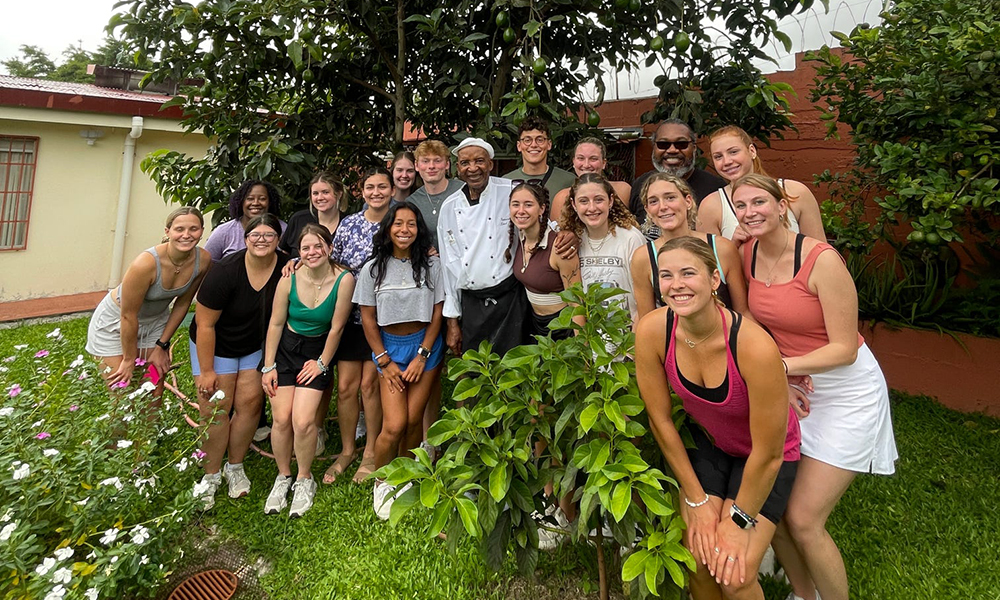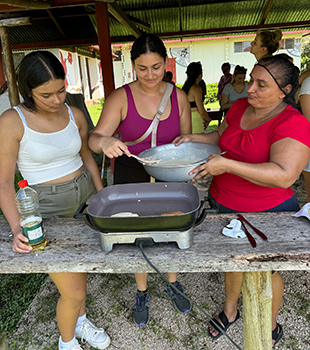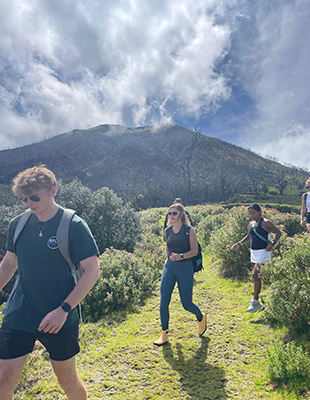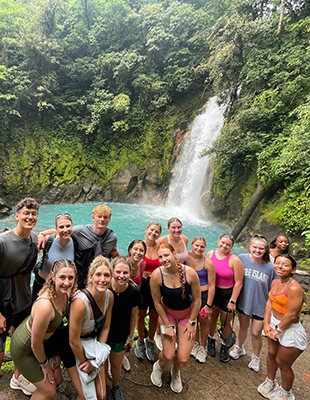Costa Rica study abroad explores wellness, community, longevity
College of Health and Behavioral Studies
On the Costa Rica FLOW (Formulas for Longevity and Wellness) study abroad trip this summer, sixteen students traveled around the region learning about social and cultural influences on health and well-being through experiential learning. The group was led by health sciences professor Santo Coleman and mathematics professor Celestine Woodruff.
The theme of the trip was “pura vida,” meaning “pure life,” a Costa Rican mantra associated with a sense of well-being and gratitude. From hiking and practicing yoga, to working on modules and projects, to engaging with locals in immersive cultural experiences, students learned much about lifestyles that promote longevity and wellness.
 “What we were looking to observe was what are those things that have caused some to have longer lives and optimal wellness — meaning, not only are they living longer, but they’re still healthy,” Coleman said.
“What we were looking to observe was what are those things that have caused some to have longer lives and optimal wellness — meaning, not only are they living longer, but they’re still healthy,” Coleman said.
Along with more physical activities like whitewater rafting and hiking mountains, students were also immersed in the culinary culture of Costa Rica. A local chef demonstrated to the group how Afro-Caribbean cuisine influenced Costa Rica cuisine. They also learned how to make empanadas, a traditional Costa Rican food, and observed traditional cooking methods.
An important excursion on the trip was visiting the Nicoya region of the country, where some residents live to 100 years old or older while maintaining optimal physical and mental health for their age.
“We met with a woman who was 102, and she was still able to recall great memories,” Coleman said. Students were able to ask the centenarians questions about their lives and lifestyles that contributed to their longevity.
Michael Neyer, a senior Health Sciences major who attended the trip, observed that healthful living seemed to be seamlessly integrated into daily activities for the people he met in Costa Rica. “I don’t think culturally they’re health conscious. They just live in a way that happens to be very healthy,” he said, noting that most exercise is related to natural or functional movement, including walking or gardening. The culture also integrates eating fresh and balanced meals, and maintaining a sense of community among friends, neighbors and family.
 Coleman shared an instance that he said, “really highlights how Costa Ricans really live ‘pura vida,’ through hospitality, a sense of community and sense of ease.”
Coleman shared an instance that he said, “really highlights how Costa Ricans really live ‘pura vida,’ through hospitality, a sense of community and sense of ease.”
“We were on a mountain going to one of the indigenous communities. Our guide thought we could be lost but wasn’t sure. He stopped at a random house on the mountain to ask the people who lived there if we were on the right track,” he said.
“He told them he was with students from the United States who came to Costa Rica to learn about the country. They said, ‘They’ve been traveling by bus; do they need to use the restroom?’ And they opened their house to us,” Coleman said. “We took pictures with them, and they told us about their family and about their life.”
“I saw a lot of multigenerational households,” observed Lauren Price, a senior Kinesiology major who attended the trip. “That’s one of the pillars of longevity, being surrounded by loved ones.”
“In the States, it’s expected for you to go off and do your own thing once you reach adulthood,” Price said. In Costa Rica, she observed “it’s more normal to stay home and live with your parents and take care of them. I think that contributes a lot to your well-being, because they’re never really lonely.”
“People are so interconnected there,” Neyer said. “Our tour guide, everywhere we went, he was friends with somebody there,” he shared as an example.
“As part of the class, students did a final project in which they made plans to recreate the experiences they had by visiting hot-water springs and waterfalls, doing yoga, visiting centenarians here in Virginia,” Coleman said. The assignment sought to answer, “how can we recreate that same kind of lifestyle here in the United States?”
“One big takeaway for me would be the generosity in the community, the importance of family and maintaining those connections, especially when you get up into your 80s and 90s,” Price said.
“I felt like that spirit of community influenced our study abroad group while we were together,” Price said. “Seeing that kind of community made us all so generous with each other.”
Similar trips will take place next summer. Costa Rica FLOW – PURA will have a similar focus to this trip, centering on health and wellness. Costa Rica FLOW – VIDA will concentrate on nutrition and math.
“I want people who are interested in [these study abroad trips] to know you will get the academic part of learning, classes, and lectures, and you will get the adventure part in hiking, ziplining, whitewater rafting,” Coleman said. “But most importantly, you’re going to get a development of community. I’m hoping students will build bonds that will last them over our lifetime” through this study abroad, he said.
